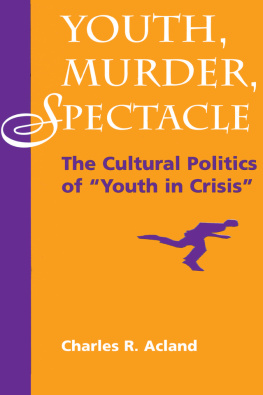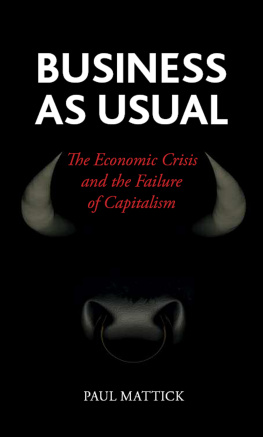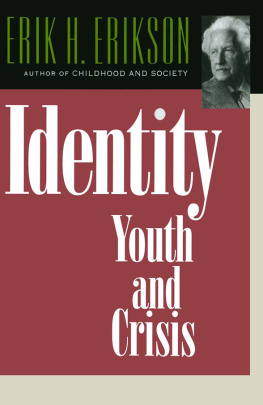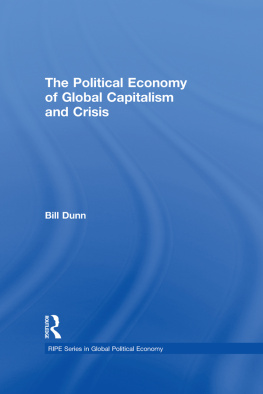UNDERSTANDING YOUTH
IN THE GLOBAL ECONOMIC CRISIS
Alan France
First published in Great Britain in 2016 by
Policy Press University of Bristol 1-9 Old Park Hill Bristol BS2 8BB UK Tel +44 (0)117 954 5940 e-mail
North American office: Policy Press c/o The University of Chicago Press 1427 East 60th Street Chicago, IL 60637, USA t: +1 773 702 7700 f: +1 773-702-9756 e:
Policy Press 2016
British Library Cataloguing in Publication Data
A catalogue record for this book is available from the British Library
Library of Congress Cataloging-in-Publication Data
A catalog record for this book has been requested
ISBN 978 1 44731 576 6 paperback
ISBN 978 1 44731 575 9 hardcover
ISBN 978-1-4473-1577-3 ePub
ISBN 978-1-4473-1587-2 Mobi
The right of Alan France to be identified as author of this work has been asserted by him in accordance with the Copyright, Designs and Patents Act 1988.
Every effort has been made to trace copyright holders and to obtain their permission for the use of copyright material. The publisher apologises for any errors or omissions in the above list and would be grateful if notified of any corrections that should be incorporated in future reprints or editions of this book.
All rights reserved: no part of this publication may be reproduced, stored in a retrieval system, or transmitted in any form or by any means, electronic, mechanical, photocopying, recording, or otherwise without the prior permission of Policy Press.
The statements and opinions contained within this publication are solely those of the author and not of the University of Bristol or Policy Press. The University of Bristol and Policy Press disclaim responsibility for any injury to persons or property resulting from any material published in this publication.
Policy Press works to counter discrimination on grounds of gender, race, disability, age and sexuality.
Cover design by Liam Roberts
Front cover image: istock
Readers Guide
This book has been optimised for PDA.
Tables may have been presented to accommodate this devices limitations.
Image presentation is limited by this devices limitations.
For Ruth, Laurie, Maria and Alex
the next generation
Contents
List of tables and figures
Tables
Figures
About the author
Alan France is Professor of Sociology in the School of Social Sciences Te Pokap Ptaiao Ppori at the University of Auckland in New Zealand. Born in the UK, he was a co-founder of the Centre for the Study of Childhood and Youth at the University of Sheffield (2002) and between 2006 and 2010 he was Director of Centre for Social Policy at Loughborough University. His research interests are on the sociology of youth and the youth question. He has published on a wide range of areas such as youth and citizenship, youth crime, youth and risk taking, and youth policy. His previous publications include Understanding Youth in Late Modernity (2007, Open University Press) and A Political Ecology of Youth and Crime (with Dorothy Bottrell and Derrick Armstrong) (2012, Palgrave Macmillan).
Acknowledgements
I was helped in this project by a number of people and it is important they are acknowledged. I would like to thank Derrick Armstrong, Rob MacDonald, Phil Mizen, Dorothy Bottrell, Howard Williamson, Line Nyhagen, Edward Haddon and Ewa Krzaklewska, who made the time to read sections of the book and provide important feedback. Having these critical friends was invaluable and, while the final analysis is mine, I am aware that they have made a contribution to my thinking and writing. I would also like to thank Tracey Sharpe and Bertalan Magyar, who helped me gather and collate important information on the eight case study areas. They provided insightful comments and very useful information on localised developments. They had an almost impossible task of trying to respond to my relentless search for answers. Thanks also to Isobel Bainton and her team at Policy Press. Her patience and guidance at difficult stages was always valuable and I appreciate the support they have offered throughout the process. I would also like to thank the University of Auckland, which provided me with resources and the time to complete this task. Special thanks also to Judy McDonald and Angela Maynard, who helped with the proof reading. Finally, I want to thank Jan, my partner and best friend of 41 years, who has always encouraged and supported me.
Introduction
Background
Over the last thirty years it has become increasingly clear that significant changes have taken place worldwide, that are reconfiguring and changing the experience of growing up for those leaving compulsory education at sixteen. Of course, these experiences are not uniform but it is safe to say that the world for the young today now looks significantly different to that experienced by their parents and grandparents. Major changes across the previous three decades, especially in young peoples experiences and opportunities to education, training and employment, have seen the process of growing up in many countries extended and redefined. With the coming of the 2007 financial crisis it also seemed that the young were adversely affected especially as a result of high unemployment. This event undoubtedly created an economic and social rupture in a number of epicentre nations, but it also had a global ripple effect, creating significant political and economic impact in countries that were not central to the crisis (Konzelmann, 2014). The question then arose of what impact this crisis, and the great recession that followed, had on what it might mean to be young today. Yet to make sense of this we need to locate the discussion in a historical context, exploring some of the major economic and political changes which have been taking place that provided the setting and environment of how nation states responded to the 2007 crisis.
To achieve this the book will undertake a detailed examination of developments in eight nation states to illuminate young peoples experiences of growing up today. These countries are the United Kingdom, Australia, New Zealand, Canada, Spain, Japan, Poland and Norway. It is important to recognise that this is not a global analysis; in such a diverse world that task would be impossible. The analysis is of a range of countries defined as belonging to developed or advanced economies (OECD, 2014a). While such terms are a reflection of Western-Northern hegemony, rooted in a colonising history that sees modernisation or advancement as natural or evolutionary, the term does define a group of countries that have significant economic power and influence over the rest of the world (Hoogvelt, 2001). This classification includes countries such as the US, the United Kingdom (UK), Germany, France, Australia and many others (OECD, 2014a).
Youth is a social construct that is defined by age categorisations. It can include those aged between 11 and 30, depending on a wide range of factors (Wallace and Kovatcheva, 1998). In this analysis I am concentrating on how social change has affected young people aged 16 to 24. The focus is particularly on young peoples progress through this age period and concentrates on their experiences in the subfields of education, training, paid work and the welfare system. The reasons for this are fourfold. First, it allows me to give attention to a particular phase of youth that has been undergoing substantial social change. Traditional trajectories through this stage of the life course have been radically reformulated, more than for any other age stage; therefore it is appropriate that a book on social change concentres on this age period. Second, the focus on this age band is partly pragmatic in that it allows me to maintain a clear focus on the subject under review. There is always a danger in writing about youth that they are viewed as homogeneous, when in reality there are enormous differences across these age bands (let alone between different social groups). What it means to be a young person at 13 is very different from what it means to a 20-year-old. Third, the concentration on employment, education, work and welfare arises partly because of limits of space. I recognise that other aspects of young peoples lives, including leisure and cultural activities, consumption patterns and family relationships are important, yet I suggest that how they experience being and becoming, is strongly influenced by their relationships with post-schooling structures and institutions that aim to manage their movement towards adulthood. For example, getting a job and earning a wage is still seen as a fundamental requirement for independent living. Finally, while there have been attempts to examine this period of the life course by looking at national trends (for example; Furlong and Cartmel, 2007 in the UK; Woodman and Wyn, 2014 in Australia; Andres, 2010 in Canada), cross-national analysis is more limited. While a number of good studies have involved international comparisons (Andres and Wyn, 2010 [Canada and Australia]; Roberts, 2009 [post-communist countries]; and Antonucci et al, 2014 [a European comparative analysis]), the analyses in these studies were mostly unable to explore the impact of the most recent economic crisis and great recession.













